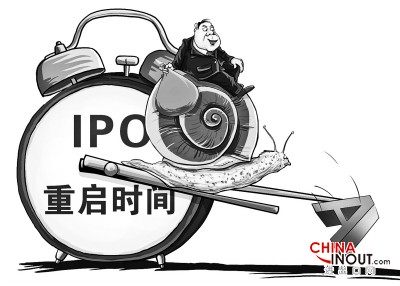本周五,中国证监会宣布其将重启IPO(首次公开募股)。今年七月,证监会暂停IPO来减缓股市行情暴跌所带来的的冲击。
中国证监会的发言人邓舸于本周五的新闻例会上宣布了此消息。
证监会称此前暂缓发行的28家公司将率先完成发行,并补充说这些公司有两周时间做准备,第一批上市的10间公司将在11月20日之后发行股票。
此公告标志着中国股市在夏季的动荡之后终于趋于稳定,本周的沪深300指数达到了六月以来的最好水准。
在八月份跌至谷底之后,中国大陆股指攀升超20%,预示着牛市的回归。
国都证券的分析师肖世俊表示:“在中长期内,这对于股市来说是利好消息。因为它会引入新鲜资金。然而这也会给投资者们带来一些心理压力,他们担心短期内会有现金分流的状况发生。”
今夏股市的崩盘的部分原因是大量的IPO冲击泡沫化和高度杠杆化的市场。
汤森路透的数据显示,截至六月中旬。即证监会暂停IPO以前,中国大陆的公司已经在IPO募得资金共234亿美元,远远超过2014年的总额132亿美金。
证监会曾一度在每周通过40家公司的申请,而二次发售的获准数量则更多。
肖世俊称:“我认为此次重启会再次引发股市溃败。六月份的高杠杆已经破坏了基本面。在监管者冒进的举措之下,如今的市场根本不存在基本面了。”
海通证券的分析师张琦表示,尽管IPO重启,但仍受到定价受限和其他政策的影响,他希望散户们能够认真定夺究竟能在其中获得多少利益。
“我也希望IPO规则能有更多的变化,包括对于主要利益相关人的股份认购配额的规定”
中国证监会称其将改变当前IPO审批机制,将审慎监管条件改为信息披露要求。
然而,本意是防止内部人员欺诈投资者的规定抑制了IPO股价,给具有认购资格的投资者们牟利空间。
首日,几乎所有上市公司的股指都上升了最大限度44%,并且大多数在接下来几周内持续走高,上升了三位数。
IPO被超额认购,超出了130倍的数目。并且来自热情高涨的认购者的第三方资金暂时引入了数万亿价外期权,从而使利率扭曲。
证监会称在其官网的一份文件指明,为减少小型上市公司的负担,其将取消第三方托管要求,并取消少于200万股的IPO的建档时间。(中国进出口网)
China's securities regulator said on Friday it would allow the resumption of initial public offerings in China, lifting a suspension put into effect in July as regulators desperately tried to slow a devastating stock market crash.
China Securities Regulatory Commission (CSRC) spokesman Deng Ge made the announcement at a weekly news conference in Beijing.
The CSRC said that 28 companies which had seen their already-approved listings halted by the freeze would be the first out of the gate, adding they have two weeks to prepare for the resumption, with the first batch of 10 companies launching after November 20.
The announcement comes after signs Chinese stock markets have finally stabilized after a rocky summer; this week the CSI300 index .CSI300 posted its best weekly performance since June.

Mainland stock indexes are up by more than 20 percent from the bottom of a crash struck in August, technically marking a return to a bull market.
"This is a good news for the stock market in the mid-to-long term as it will introduce fresh cash, though it will also bring some psychological pressure to investors as they are afraid of diversion of the cash in the short term," said Xiao Shijun, analyst at Guodu Securities in Beijing.
The stock market crash over the summer was partly blamed on a spate of IPOs hitting an already frothy and heavily leveraged market.
Companies in mainland China had raised $23.4 billion in IPOs in 2015 through mid June before regulators suspended deals, far surpassing the $13.2 billion in all of 2014, Thomson Reuters data showed.
At one point the CSRC was letting 40 companies list every week and there were even more secondary issuances.
"I don't think the resumption will cause a market stampede again," said Xiao. "In June, the fundamentals were distorted by high leverage, which does not quite exist in the current market after regulator's aggressive moves."
Zhang Qi, analyst at Haitong Securities in Shanghai, said he expected retail investors to be skeptical of how much they will benefit from the resumption of IPOs, which were highly distorted by pricing restrictions and other policies.
"I am also expecting further changes to IPO rules, including to the quota for major stakeholders share of subscriptions."
The CSRC has said it would migrate away from its current approval system for IPOs to system in which companies merely register to list without requiring regulatory clearance.
However, rules aimed at preventing insiders from fleecing investors suppressed IPO pricing, unintentionally creating an easy profit for those investors able to subscribe.
Nearly every listing in China rose by the maximum allowable 44 percent on the first day, and most went on to rise into triple digits in the following weeks.
As a result, IPOs went oversubscribed by an average of 130 times, and the escrowing of cash by aspiring subscribers temporarily sucked trillions out of the money markets and distorted interest rates.
The regulator said in a document posted on its website that it was eliminating the escrow requirement, and also eliminating the bookbuilding period for IPOs with fewer than two million shares, to reduce costs for smaller listing companies.











